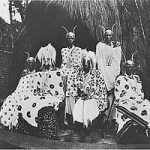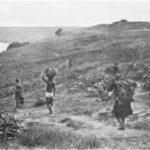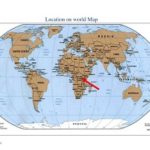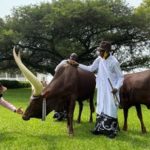The Arrival of the White Fathers
Unlike the notables of the central kingdom, other subjects of the mwami overcame their repugnance to the ibisimba and sought protection from them. When the German explorer von Gôtzen had visited Rwanda, he had traveled through the eastern part of the kingdom known as Gisaka. Gisaka had been an independent kingdom under its own dynasty until its conquest by Rwanda in the mid-nineteenth century. Immediately after the conquest, the mwami had allowed the aristocracy of Gisaka to continue governing the region, although he had destroyed the ruling dynasty. Musinga’s father, Rwabugiri, had sought to extirpate local loyalties and enrich his own favorites by replacing the indigenous notables with men from the central kingdom. The people of Gisaka resented these recently imposed rulers and so enthusiastically by welcomed von Gôtzen and a later traveler named Ramsay. They hoped to win the aid of these “mami-kings” against the powerful mwami of Rwanda.
Within the central kingdom, those who hoped for protection from the strangers dared not accord them such a joyous reception. Instead, they sought out the foreigners privately when the notables were absent. Kandt wrote of the Hutu:
“In the presence of their lords, they were sober and reserved and tried to avoid our questions. But as soon as the Tutsi had turned their backs on our camp, they were willing to tell us everything that we wanted to hear and much that we did not because I could do nothing about the numerous grievances about which they complained, their lack of rights, their oppression”.
Kandt refused the role of protector, mocking the Hutu who “could only whine and complain like women” after having let themselves be subjugated by the Tutsi. He casually suggested that they try “self-help.” In northwestern Rwanda, Kandt found the Hutu still vigorously resisting the extension of rule by the Tutsi, but not at all interested in his assistance. In these outlying regions, the roles were reversed: it was the notables, insecure in their authority and distant from supervision by the Court, who sought his protection.
The early attempts to secure the protection of Europeans fore-shadowed what would happen when a larger number of foreigners intent on making closer contacts with the people came, to live in Rwanda. Preparations for sending such a group began the year after the protectorate was established. Roman Catholic missionaries of the Société des Missionnaires d’Afrique, usually known as the “White Fathers” because of their customary white cassocks, decided to open a mission station in Rwanda. The French cardinal Lavigerie had founded the order in 1868 exclusively for work in Africa, and he had instilled in his missionaries his own belief that Christianity would be widely accepted in a country only when it was adopted by the chiefs. He emphasized over and over that “in winning a single chief you will do more for the advancement of the mission than in winning hundreds of poor blacks.” The key to winning the chiefs lay in taking their power seriously, making certain that they realized that Christian teaching would support their authority Lavigerie decreed that the chiefs were not to be held to absolute obedience of such laws of the church as monogamy; they should begin the four-year preparation for baptism without having to make any sacrifices. Should they later withdraw when sacrifices were required, many of their subjects who in the meantime would have been attracted to the church would continue their instruction.
At the turn of the century, Monsignor Jean-Joseph Hirth supervised the White Fathers who were working in the Vicariate of Southern Nyanza,(“Nyanza” here refers to the early European name for Lake Victoria, Victoria Nyanza, not to the specific hill called Nyanza where the Rwandan Court was located from 1899).
which stretched from Lake Kivu in the west to Mount Kilimanjaro in the east. From his headquarters in German East Africa, Hirth witnessed the initial success of the White Fathers in the neighboring kingdom of Buganda. Hopeful that a similar or even greater victory might be won in Rwanda, Hirth directed several Fathers to establish a post at Katoke in Bushubi to serve as a base for opening contacts with the Rwandan Court. The envoys whom the Fathers twice sent toRwanda were received well by the Bega rulers, who in turn dispatched twenty representatives to convey their greetings to the White Fathers. Since the Rwandan representatives undoubtedly also gathered as much information as possible about the Fathers, Kanjogera and her brothers were well aware of their activities by the time that the first Fathers arrived at the Court in February 1900.
En route the Fathers’ caravan hadpassed through Burundi, stopping at the German posts at Bujumbura and Shangi. Since the Germans approved of the establishment of missions, the district officer, Captain von Bethe, had sent his own interpreter ahead to prepare the Court for the arrival of the missionaries. To be certain that the Court understood that the Germans meant to back the Fathers in their request for a place to settle, he also delegated two of his soldiers to accompany the caravan. The German message was clearly received by the Bega rulers, who understood the Fathers to be clients of the Germans, charged with handling their spiritual matters.The realization that the Fathers were especially concerned with the supernatural did not, however, lead them to under-estimate the extent to which the Fathers might become politically involved. They assumed that the European missionaries, like traditional Rwandan diviners, could have a great influence on political decisions.
At Court the Fathers met with Ruhinankiko, Kabare, and Musinga’s stand-in, Mpamarugamba, whom they took to be the real mwami. After the missionaries had declared their desire to teach the Rwandans their faith and had requested land on which to settle, Kabare took the lead in trying to persuade them to accept a location in either the northwestern province of Bugoyi or in Gisaka, in the southeast, both far removed from the Central Court. Still allowed to participate in royal councils, though with much reduced influence, Kabare perhaps hoped to regain the favor of Kanjogera by restricting the missionaries to the outskirts of the kingdom.But true to their instructions to locate as near as possible to the center of power, the Fathers rejected these places so distant from Nyanza, where the Court had taken up residence. In the end the Court conceded them the right to settle at Mara or Save, two hills in the southern province of Bwanamukari.Although closer to Nyanza, these hills were known for their troublesome inhabitants; Rwabugiri had pillaged Save three times for defying his orders.The Court hoped that the Fathers would rapidly become discouraged in such an inhospitable setting.
Speaking for the regents, Mpamarugamba also specified that the Court was interested in secular learning. At some time in the future, a Father could come to teach the reading and writing that seemed to besuch useful tools in dealing with Europeans. But religious teaching was to be only for the Hutu and Twa.The Tutsi were not to be approached; they were the men of the mwami and of him alone.While thus consciously or unconsciously blocking the strategy of the Fathers, the Court also indicated that even at this point it realized that full acceptance of the new faith might be inconsistent with complete loyalty to the mwami. Unable to refuse outright the clients of the Germans, the Court sought to compromise by allowing them to instruct the ordinary people while at the same time prohibiting them from preaching to the Tutsi, whose allegiance the Court most valued.
The Fathers were disappointed at this restriction. As one put it, they had found the young men at Court “the most interesting yet encountered . . . with an intelligent air, aware, curious, but yet discreet and proper in their behavior.”But they were soon occupied with building their post at Save and with getting acquainted with the neighboring people. Afraid of the newcomers, the people agreed among themselves not to give the Fathers wood or water, hoping that they would thus be driven away. The Fathers first won the trust of the children, tossing them beads, a valuable trade item, and asking them to bring food. Cyitatire, brother of Musinga, commanded the region of Bwanamukali and so was charged by the Court with helping the Fathers in their establishment. Under his orders, the people of the area brought materials and built the Fathers’ first shelter. In these early weeks, no other mutware visited the mission, although many sent Hutu representatives with gifts of welcome.
The Hutu rapidly learned to trust the Fathers. Before the first month was out, the sick were arriving for medicine, and by the second month the Fathers were remarking that “there [was] always a great crowd at the station of those who work, sell and complain.”Even more important to the Hutu than the medicine and trade goods was the potential protection that the Fathers might give. In April the missionaries took in about fifty children for religious instruction, commenting that they could easily have had a thousand if they had had the means to care for them. The Father Superior wrote that the children had come “to pay court,”guhakwa, and referred to instructing his “clients,” bagaragu. The Hutu, particularly those near the station, succeeded in capitalizingon the opportunities created by the arrival of influential strangers without incurring the attendant risks.
Suspicious about the missionaries from the start, the Court began to be alarmed at their success in attracting the Hutu. In May 1900 the Fathers remarked that the Hutu seemed to acknowledge only their authority. The Court was further concerned because of the friendship that had developed between the missionaries and Cyitatire. As a potential rival to Musinga, Cyitatire had been distrusted at Court ever since the coup in 1896. Although he had finished assisting the Fathers and had left Save in March, he still had not returned to Nyanza by May. Because his aid to the missionaries had gone beyond what the Court thought was necessary, he feared accusation as a traitor and possible death at the hands of Kanjogera and her brothers. To counter the Court’s growing alarm, the Father Superior asked it to send several of its most trusted batware to live near the mission and to see that the Fathers were “the whites of Yuhi [Musinga] and not of Kyitatire.”
Kayijuka and Kaningu, the two young batware sent by the Court, overwhelmed the Fathers with gifts of cattle, goats, and produce.But at the same time, the local Hutu repeatedly warned the Fathers that these batware had come to attack the mission. The Fathers dismissed these rumors as attempts of the Hutu to keep them from allying with the batware. There was, however, a kernel of truth in the rumors. The Court itself did not want war, but it warned the Fathers that there were some batware who opposed its policy and wished to attack. In protesting its good intentions to the mission, the Court frankly declared that it was the friend of the White Fathers because they were the friends of Captain von Bethe.
Those who wished to attack also realized that German support was essential to the mission. They hoped to take advantage of the withdrawal of the German troops who had temporarily left Shangi, in the far south-west, to defend part of the Burundi-Congo frontier against a threatened attack from the Congo.As the Father Superior commented, it was fortunate for the mission that the border conflict was quickly resolved. Otherwise, the militant faction might have won control at Court and launched an attack on the mission.By June the German troops had returned to Shangi. At this time Kabare was sent to command the troops garrisoning the southern province of Bugesera against raids by Cyoya, a powerful notable from Burundi. Although the need for a capable commander at the frontier was real enough, Kabare’s designation to fill the position was regarded as an exile from Court. It is possible he had led the faction that advocated use of force against the Fathers. If so, this commission to defend Bugesera was both a punishment and a convenient way of preventing him from causing further trouble in central Rwanda.
Although the Court itself had not planned to attack the mission, it had taken the Fathers’ invitation to send observers to Save as a useful opportunity to curb unobtrusively the growth of the missionaries’ influence. Its representatives Kayijuka and Kaningu discouraged the Hutu from visiting the station. After complaining about this, the Father Superior succeeded in having the batware recalled to Nyanza. As soon as they left the area, the Hutu returned in even larger numbers to the station, probably seeing the White Fathers as victors in this power struggle with the Court.
Several months later, the Court and the missionaries faced off again in a trial of strength. In August the Fathers heard the rumor that Njangwe, one of their young Rwandan followers, had been killed at Nyanza. Although one version of the story indicated that he had been condemned for a theft committed sometime in the past, the Fathers were more inclined to accept another explanation, that he had been killed because he was a “mugaragu” of the missionaries.* They were determined to secure punishment of the guilty party or at least some compensation for the killing; they believed that if they did not, the Hutu would stop coming to the mission.
The Court, for its part, maintained that the young man had not been killed, but that his whereabouts was temporarily unknown. Kanjogera and Ruhinankiko were strongly attached to Kayijuka, who was accused of the killing, and did not wish to punish him. Still, the possibility that the Fathers might ask the Germans to intervene in the case made them unwilling to refuse satisfaction to the missionaries.At this time the Court continued to be threatened by raids of the Barundi, winch Kabare and his troops had not been able to end completely. It was rumored that the Barundi were sheltering the contender Biregeya, who was awaiting a propitious moment to cross the border and unseatMusinga. Indeed, there were some who said that Biregeya was already at Save, where he was being protected by the White Fathers, who were willing to support his claim to the throne.
Reluctantly the Court decided to reach an accommodation with the Fathers. To handle the delicate negotiations, it turned to Richard Kandt. The Court reasoned that Kandt was close enough to the White Fathers to be able to influence them but that he also stood enough apart from them to be able to represent the interests of the Court. During his two years in the kingdom, Kandt’s admiration for his social and political system had developed into a sympathetic relationship with the Court. Carrying on research in an unostentatious fashion—he traveled without the large caravans and numerous soldiers who accompanied most Europeans—he had demonstrated to the Rwandans that he trusted them. Kandt must also have seemed more perceptive than his compatriots to the Rwandans: of the foreigners who visited Nyanza between 1897 and 1900, Kandt was the only one to declare that Mpamarugamba was obviously a fake. Before arriving in Rwanda, Kandt had inquired among neighboring peoples about the approximate age of Musinga. Having everywhere been told that he was an adolescent, Kandt had no difficulty realizing that the forty-year-old Mpamarugamba was only playing the role of mwami. Several weeks before the Njangwe affair, the Court had finally acknowledged that Kandt was correct and allowed him to meet Musinga. From this time forward, Musinga himself met Europeans when they came to Nyanza.
Kandt agreed to serve as intermediary and arranged for the Fathers to accept a compensation of forty cattle to be paid by Kayijuka. On the order of the Court and under pressure from Kandt, who was temporarily living near Kayijuka’s residence, the mutware paid the fine, all the while maintaining his innocence.Ten days later the missing Njangwe was found: he had been on a trading expedition to the northwestern province of Bugoyi. When Kayijuka appeared with his supposed victim at the mission, the Father Superior immediately admitted his mistake and tried to return the cattle that had been paid as compensation. Kayijuka refused to accept them, declaring that the Father had demanded them mistakenly but not maliciously and that “one does not take back what one has given to his shebuja.”The embarrassed Father kept the cattle, but in return loaded Kayijuka with gifts. As Kayijuka said:
What he then gave Kayijuka was simply immeasurable. You cannot know really how much it was: all the Hutu who had accompanied him [to the mission] had to carry something. You know yourself.., how numerous is the following of a prince. Kayijuka had even to give up his hammock* (to be carried by Hutu clients) so that they could take home all that he had received from the Father. Kayijuka had originally been accused by an enemy who had hoped to bring the rising young mutware into disrepute with the Fathers, the Court, or both. However, in the end, Kayijuka emerged the winner: his standing at Court did not suffer, and his ties with the Fathers were stronger than ever. Though graciously acknowledging the missionaries to be his patrons, he had in effect put them in his debt by refusing to take back his cattle. His gift of cattle did not make them his clients, but it did oblige them to see him as a generous and loyal follower whom they should support. Kayijuka was to draw upon this support throughout his life.
https://uk.amateka.net/the-arrival-of-the-white-fathers/https://uk.amateka.net/wp-content/uploads/2022/11/father.jpghttps://uk.amateka.net/wp-content/uploads/2022/11/father-150x150.jpgModel CitizenshipUnlike the notables of the central kingdom, other subjects of the mwami overcame their repugnance to the ibisimba and sought protection from them. When the German explorer von Gôtzen had visited Rwanda, he had traveled through the eastern part of the kingdom known as Gisaka. Gisaka had been an...BarataBarata rpierre@ikaze.netAdministratorAMATEKA | HISTORY OF RWANDA




